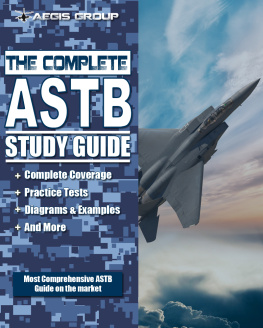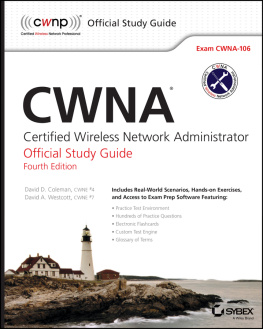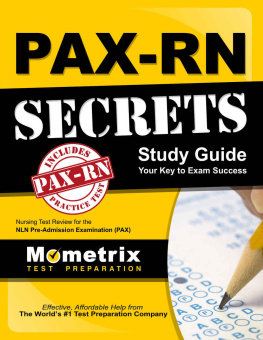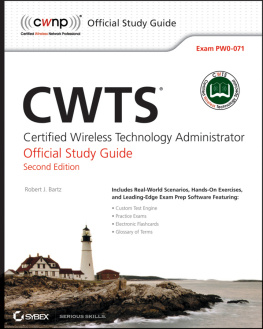The Official CNA Study Guide
Certified Nursing Assistant Practice Test and Skills Test for the NNAAP Exam
Deborah Clark
Aegis Group LLC
The Complete CNA Study Guide
Copyright 2015 by Aegis Group LLC
All rights reserved. This book or parts thereof may not be reproduced in any form, stored in any retrieval system, or transmitted in any form by any meanselectronic, mechanical, photocopy, recording, or otherwisewithout prior written permission of the publisher, except as provided by United States of America copyright law.
Disclaimer
Every effort has been made to ensure that the content provided on this book is accurate and helpful for our readers at publishing time. However, this is not an exhaustive treatment of the subjects and as you probably know, different States have different requirements and readings. No liability is assumed for losses or damages due to the information provided. You are responsible for your own choices, actions, and results.
To all of the incredible Certified Nursing Assistants out there taking care of the sick and needy. Your job does not receive enough praise for the incredible and meaningful work you do time in and time out.
This book is dedicated to previous, current and soon to be CNAs everywhere.
INTRODUCTION
The nursing profession is one of the most important professions in the health care field. This is because nurses are at the forefront of patient care, performing myriad functions all in the aim to assist their patients into healing, recovery, and whenever possible, an improved state of health. Some individuals in the nursing community are the CNAs. CNAs, or Certified Nursing Assistants, are significant members of the nursing profession since they are on the forefront and lend their valuable assistance to other members of the nursing profession in caring for patients.
CNAs do important tasks that are vital to the health care profession such as taking patients vital signs, assisting in putting them in the best possible or most comfortable position, and assisting with feeding.
These tasks require that CNAs be competent and possess the necessary skills to be able to care for their patients safely and effectively. To prove this competency, Certified Nursing Assistants must pass the competency exam.
THE CNA COMPETENCY EXAM
For those who aspire to work as a CNA, an examination is a requirement prior to holding a valid CNA license, which is one of the most important requirements for practice. If you want to become a qualified CNA, the first thing you need to complete is a training course that involves both theoretical and practical knowledge on the job functions of a CNA. Training courses usually last 12 weeks on average and incorporate the concepts that are part of the examination. The CNA examination will also determine if you, as a practitioner, can work in different patient care settings such as hospitals or other care facilities like nursing homes.
The CNA exam is usually issued by the state in which you wish to practice, and therefore may vary in content depending on the state where you are taking it. Regardless of the variations however, the core concepts of the examinations are similar and there are two parts of the examinations given within the United States.
The most popular concepts covered in both the written and practical components of the exam are about your knowledge of different techniques in providing safe and effective patient care, principles of effective communication with the patient and other members of the health care team, and knowledge about safety guidelines and procedures. Successfully passing both the written and practical portions of the test allows you to work as a CNA in your respective state.
Written Part of the Exam
The first part of the CNA examination is the written test. This is composed of multiple choice questions where youll be asked to choose the best answer based on the situation provided in the question. Questions that are usually part of the written exam consist of concepts concerning nutrition and patient hygiene, control of infection, knowledge of different therapeutic procedures and practices, and maintenance of an appropriate conduct in the workplace. Also, part of the concept being tested in this part of the exam is how you are able to meet the psychosocial needs of your patients and their families, and your knowledge of different ethical considerations in caring for patients.
Clinical Skills Test
The clinical skills section of the CNA exam tests your skills on actual provision of care for patients. This part will have you demonstrate different nursing tasks and activities on a model patient as the examiners assess and grade you on your skills. The most common skills you will be assessed for include obtaining blood pressure readings, feeding and bathing a patient, assisting in dressing an individual and the use of different equipment to carry out activities of daily living, such as bed pans and bedside commodes.
Furthermore, the practical component of the exam may also require an examinee to demonstrate assistance for a patient as he or she performs range of motion exercises and ambulation. Hand washing may also be part of those skills that would be tested as well as how a CNA observes proper communication and interaction with patients.
Certification Standards
Becoming a certified nursing assistant is somewhat of a complex evolution. Unlike most certifications, CNA certification requirements are different for each state. Without a national standard, being certified in one state does not necessarily mean your certification will carry over to another state.
However, the difference between the Written Exams (WE) and the Critical Skills Exams (CSE) between different states is minimal. Furthermore, there is a standardized testing process that does allow you to transfer your certification between certain states.
The National Nurse Aide Assessment Program (NNAAP) is the largest nurse aide certification examination program in the United States with over 200,000 written and practical exams administered annually. Under the jurisdiction of the National Council of State Boards of Nursing (NCSBN), 25 states are now utilizing the NNAAP exam to measure the nurse aide basic level competency, namely:
Alabama, Alaska, California, Colorado, District of Columbia, Georgia, Guam, Louisiana, Mariana Islands, Maryland, Minnesota, Mississippi, New Hampshire, North Carolina, North Dakota, Pennsylvania, Rhode Island, South Carolina, Texas, Vermont, Virginia, Virgin Islands, Washington, Wisconsin, Wyoming
The development of the NNAAP test plan reflects the knowledge, abilities, and skills essential for the CNA candidate to meet patients needs regarding health promotion, maintenance, and restoration of health. NNAAP test plan provisions are grounded on evidence-based practice of newly-certified nurse aides. These include CNA activities in relation to the significance of their performance, their impact on client safety, and the settings of care rendered.
So as to help best prepare you for the certification process, this study guide will use the structure and process of the NNAAP for the following reasons:
- You have about a 50/50 chance of one day taking an NNAAP certification at some point in your career. Therefore, it is the most useful and pertinent of the certification processes to follow.
- In order to convince states to relinquish control of their own certification process and adopt the NNAAP as a set standard, the NCSBN had to prove to each state that their certification process was a better indicator of qualification and presented a higher standard than what previously existed. Therefore, it can be assumed that the NNAAP is a more difficult process and requires more effort than other state exams.










